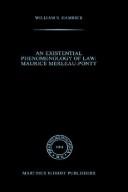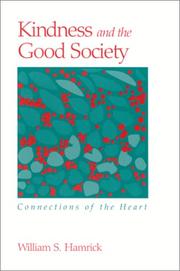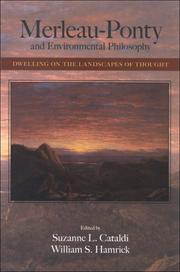| Listing 1 - 8 of 8 |
Sort by
|

ISBN: 9024729262 9024731976 9401096120 9789024729265 Year: 1985 Volume: 92 Publisher: Dordrecht,Boston : M. Nijhoff,
Abstract | Keywords | Export | Availability | Bookmark
 Loading...
Loading...Choose an application
- Reference Manager
- EndNote
- RefWorks (Direct export to RefWorks)
by Wolfe Mays It is a great pleasure and honour to write this preface. I first became ac quainted with Herbert Spiegelberg's work some twenty years ago, when in 1960 I reviewed The Phenomenological Movement! for Philosophical Books, one of the few journals in Britain that reviewed this book, which Herbert has jok ingly referred to as "the monster". I was at that time already interested in Con tinental thought, and in particular phenomenology. I had attended a course on phenomenology given by Rene Schaerer at Geneva when I was working there in 1955-6. I had also been partly instrumental in getting Merleau-Ponty to come to Manchester in 1958. During his visit he gave a seminar in English on politics and a lecture in French on "Wittgenstein and Language" in which he attacked Wittgenstein's views on language in the Tractatus. He was apparently unaware of the Philosophical Investigations. But it was not until I came to review Herbert's book that I appreciated the ramifications of the movement: its diverse strands of thought, and the manifold personalities involved in it. For example, Herbert mentions one Aurel Kolnai who had written on the "Phenomenology of Disgust'!, and which had appeared in Vol. 10 of Husserl's Jahrbuch. It was only after I had been acquainted for some time with Kolnai then in England, that I realised that 2 Herbert had written about him in the Movement. The Movement itself contains a wealth of learning.
Theory of knowledge --- Phenomenology --- Phénoménologie --- 165.62 --- Philosophy, Modern --- Fenomenologie --- Phenomenology. --- 165.62 Fenomenologie --- Phénoménologie --- Fenomenologie. --- Phenomenologie --- Essais

ISBN: 9024735203 9048183022 9401707073 9789024735204 Year: 1987 Volume: 104 Publisher: Dordrecht : Martinus Nijhoff,
Abstract | Keywords | Export | Availability | Bookmark
 Loading...
Loading...Choose an application
- Reference Manager
- EndNote
- RefWorks (Direct export to RefWorks)
The following pages attempt to develop the main outlines of an existential phenomenology of law within the context of Maurice Merleau-Ponty's phe nomenology of the social world. In so doing, the essay addresses the rather narrow scholarly question, If Merleau-Ponty had written a phenomenology of law, what would it have looked like? But this scholarly enterprise, although impeccable in itself, is also transcended by a more complicated concern for a very different sort of question. Namely, if Merleau-Ponty's phenomenological descriptions of the social world are correct-as I believe they largely are-then what are the philosophical consequences for an adequate understanding of law? Such a project may well occasion a certain surprise amongst observers of the contemporary philosophical landscape, at least in what concerns the terrain of continental thought, and for two different reasons. The first is that, although interest in Merleau-Ponty's work remains strong in the· United States and Can ada, his philosophical standing in his own country has been largely eclipsed! by that of, first, his friend/estranged acquaintance, Jean-Paul Sartre; by various Marxist philosophies and critical social theories; and finally by those doing her meneutics of language. In my view, current neglect of Merleau-Ponty's thought in France is most regrettable.
Legal theory and methods. Philosophy of law --- Merleau-Ponty, Maurice --- Law --- Existential phenomenology --- Droit --- Phénoménologie existentielle --- Philosophy --- Philosophie --- Merleau-Ponty, Maurice, --- 340.16 --- Academic collection --- Existentialism --- Phenomenology --- Philosophy, Modern --- Juridische logica. Juridische software --- -Merleau-Ponty, Maurice --- Existential phenomenology. --- Philosophy. --- 340.16 Juridische logica. Juridische software --- Phénoménologie existentielle --- Jurisprudence --- Merleau-Ponty (Maurice) / et Lois. --- Merleau-Ponty (Maurice) / en Wetten. --- Law - Philosophy --- Merleau-Ponty, Maurice, - 1908-1961 --- Merleau-Ponty, Jean Jacques Maurice, --- Merlō-Ponty, Mōris, --- Ponty, Jean Jacques Maurice Merleau-, --- Ponty, Maurice Merleau-, --- מרלו־פונטי, מוריס, --- Merleau-ponty (maurice), philosophe francais, 1908-1961 --- Philosophie moderne --- Critique et interpretation --- 20e siecle

ISBN: 0791489140 0585476225 9780585476223 0791452654 9780791452653 0791452662 9780791452660 9780791489147 Year: 2002 Publisher: Albany : State University of New York Press,
Abstract | Keywords | Export | Availability | Bookmark
 Loading...
Loading...Choose an application
- Reference Manager
- EndNote
- RefWorks (Direct export to RefWorks)
Winner of the 2004 Edward Goodwin Ballard Book Prize in Phenomenology presented by the Center for Advanced Research in Phenomenology with interest from a fund raised from Professor Ballard's family, students, and friendsKindness and the Good Society utilizes phenomenology and a wide variety of traditional and non-traditional sources to provide the first comprehensive account of kindness in any genre of philosophy. Remarkably rich in descriptive detail and drawing upon a wide range of examples, including literary sources, current affairs, and traditional philosophical texts, Hamrick's book rescues kindness from the purposeful neglect of deontological and utilitarian ethical theories. Beginning with an account of the personal and social areas of ethical and moral comportment, Hamrick addresses what is not intuitively obvious about kindness and its opposite, details a critical kindness that avoids both naiveté as well as popular cynicism, and guides us toward a new notion of aesthetic humanism.
Kindness. --- Affection --- Conduct of life --- Virtues. --- Virtue
Book
ISBN: 1438459602 9781438459608 9781438459592 1438459599 Year: 2016 Publisher: Albany, New York : State University of New York Press,
Abstract | Keywords | Export | Availability | Bookmark
 Loading...
Loading...Choose an application
- Reference Manager
- EndNote
- RefWorks (Direct export to RefWorks)
This collection of essays brings together diverse but interrelated perspectives on art and perception based on the philosophy of Maurice Merleau-Ponty. Although Merleau-Ponty focused almost exclusively on painting in his writings on aesthetics, this collection also considers poetry, literary works, theater, and relationships between art and science. In addition to philosophers, the contributors include a painter, a photographer, a musicologist, and an architect. This widened scope offers important philosophical benefits, testing and providing evidence for the empirical applicability of Merleau-Ponty's aesthetic writings. The central argument is that for Merleau-Ponty the account of perception is also an account of art and vice versa. In the philosopher's writings, art and perception thus intertwine necessarily rather than contingently such that they can only be distinguished by abstraction. As a result, his account of perception and his account of art are organic, interdependent, and dynamic. The contributors examine various aspects of this intertwining across different artistic media, each ingeniously revealing an original perspective on this intertwining.
Perception (Philosophy) --- Art --- Beautiful, The --- Beauty --- Aesthetics --- Art and philosophy --- Philosophy --- Philosophy. --- Analysis, interpretation, appreciation --- Merleau-Ponty, Maurice, --- Merleau-Ponty, Maurice --- Merleau-Ponty, Jean Jacques Maurice, --- Merlō-Ponty, Mōris, --- Ponty, Jean Jacques Maurice Merleau-, --- Ponty, Maurice Merleau-, --- מרלו־פונטי, מוריס,

ISBN: 1429498323 9781429498326 0791470512 9780791470510 0791470520 9780791470527 Year: 2007 Publisher: Albany : State University of New York Press,
Abstract | Keywords | Export | Availability | Bookmark
 Loading...
Loading...Choose an application
- Reference Manager
- EndNote
- RefWorks (Direct export to RefWorks)
Human ecology --- Ecology --- Philosophy --- Philosophy & Religion --- Ecophilosophy --- Philosophy. --- Merleau-Ponty, Maurice, --- Merleau-Ponty, Maurice --- Merleau-Ponty, Jean Jacques Maurice, --- Merlō-Ponty, Mōris, --- Ponty, Jean Jacques Maurice Merleau-, --- Ponty, Maurice Merleau-, --- מרלו־פונטי, מוריס,
Book
ISBN: 1438436181 1441696849 9781441696847 9781438436180 9781438436173 1438436173 9781438436180 9781438436166 Year: 2011 Publisher: Albany : State University of New York Press,
Abstract | Keywords | Export | Availability | Bookmark
 Loading...
Loading...Choose an application
- Reference Manager
- EndNote
- RefWorks (Direct export to RefWorks)
This is the first booklength account of how Maurice Merleau-Ponty used certain texts by Alfred North Whitehead to develop an ontology based on nature, and how he could have used other Whitehead texts that he did not know in order to complete his last ontology. This account is enriched by several of Merleau-Ponty's unpublished writings not previously available in English, by the first detailed treatment of certain works by F.W.J. Schelling in the course of showing how they exerted a substantial influence on both Merleau-Ponty and Whitehead, and by the first extensive discussion of Merleau-Ponty's interest in the Stoics's notion of the twofold logos—the logos endiathetos and the logos proforikos. This book provides a thorough exploration of the consonance between these two philosophers in their mutual desire to overcome various bifurcations of nature, and of nature from spirit, that continued to haunt philosophy and science since the 17th-century.
Ontology. --- Philosophy of nature. --- Nature --- Nature, Philosophy of --- Natural theology --- Being --- Philosophy --- Metaphysics --- Necessity (Philosophy) --- Substance (Philosophy) --- Merleau-Ponty, Maurice, --- Whitehead, Alfred North, --- Ontology --- Philosophy of nature --- Merleau-Ponty, Maurice --- Whitehead, Alfred North --- Merleau-Ponty, Jean Jacques Maurice, --- Merlō-Ponty, Mōris, --- Ponty, Jean Jacques Maurice Merleau-, --- Ponty, Maurice Merleau-, --- מרלו־פונטי, מוריס,
Dissertation

Year: 2008 Publisher: Leuven K.U.Leuven. Hoger Instituut voor Wijsbegeerte
Abstract | Keywords | Export | Availability | Bookmark
 Loading...
Loading...Choose an application
- Reference Manager
- EndNote
- RefWorks (Direct export to RefWorks)
The subject of this study is the overcoming of what Alfred North Whitehead criticized as "the bifurcation of nature" into "nature apprehended in awareness and the nature which is the cause of awareness." On this view, what passes into our eyes, light waves, is not visible, and what is visible-colors and other "secondary" qualities-is not there. Thus, we have "two systems of reality," as Whitehead observed, nature as scientific object and nature as perceived, the one being "true and not perceived" and the other "perceived and not true" (Jean Wahl). This doctrine is "the original sin of modern epistemology" (Jan Van der Veken). The bifurcation took different and even contradictory forms throughout modern (seventeenth- and eighteenth-century) philosophy, and quickly extended beyond appearances and reality to bifurcations of bodies and minds, matter and spirit, efficient and final causes, and even the relation of God and the world. The impetus created by the various forms of the bifurcation led to a philosophical and scientific commitment powerful enough to reach well into the twentieth-century. This thesis is a critical examination of the way that Maurice Merleau-Ponty attempted to overcome that view of nature and our place within it, and of the ways that Whitehead's process philosophy did help, and could have further helped, Merleau-Ponty formulate his alternative view. A Whiteheadian influence on Merleau-Ponty is missing from his earlier phenomenological texts, as he did not explicitly borrow from Whitehead until his Nature lectures at the Collège de France. Merleau-Ponty knew little about the technicalities of Whitehead's philosophy, but, at the end of his life, he felt some consonance with Whiteheadian themes, such as "the passage of nature," "brute facts," and the "fallacy of simple location." Both thinkers came together conceptually to argue against the bifurcation in their reactions to the same philosophical sources in modern philosophy, and they arrived at a convincing alternative to the bifurcation even though they approached the problem from considerably different philosophical perspectives. It is clear that Whitehead tried to overcome the bifurcation of nature in a far more systematic way than Merleau-Ponty, and that Whitehead's more elaborate conceptuality shows more precisely how the bifurcation can be overcome. This expansion would be in line with that for which Merleau-Ponty was searching in his late ontology, but which he unhappily enough was not able to develop in a systematic way. This thesis attempts to show that what Merleau-Ponty learned from his limited reading of Whitehead's texts did help him formulate his later ontology, as well as that a greater familiarity with Whitehead's process metaphysics could have offered him more adequate and precise conceptual support.
Book

ISBN: 9783110333299 Year: 2013 Publisher: Berlin Boston
Abstract | Keywords | Export | Availability | Bookmark
 Loading...
Loading...Choose an application
- Reference Manager
- EndNote
- RefWorks (Direct export to RefWorks)
| Listing 1 - 8 of 8 |
Sort by
|

 Search
Search Feedback
Feedback About
About Help
Help News
News